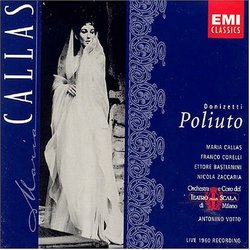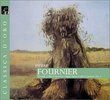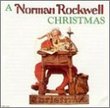| All Artists: Ettore Bastianini, Nicola Zaccaria [singer], Virgilio Carbonari, Gaetano Donizetti, Antonino Votto, L'Orchestra del Teatro alla Scala, Michael Chertock, Franco Corelli, Giuseppe Morresi, Piero de Palma, Rinaldo Pelizzoni, Maria Callas Title: Donizetti: Poliuto (complete opera live 1960) with Maria Callas, Franco Corelli, Antonino Votto, Orchestra & Chorus of La Scala, Milan Members Wishing: 0 Total Copies: 1 Label: Angel Records Original Release Date: 1/1/1960 Re-Release Date: 11/11/2002 Album Type: Import Genre: Classical Style: Opera & Classical Vocal Number of Discs: 2 SwapaCD Credits: 2 UPC: 724356544826 |
Search - Ettore Bastianini, Nicola Zaccaria [singer], Virgilio Carbonari :: Donizetti: Poliuto (complete opera live 1960) with Maria Callas, Franco Corelli, Antonino Votto, Orchestra & Chorus of La Scala, Milan
 | Ettore Bastianini, Nicola Zaccaria [singer], Virgilio Carbonari Donizetti: Poliuto (complete opera live 1960) with Maria Callas, Franco Corelli, Antonino Votto, Orchestra & Chorus of La Scala, Milan Genre: Classical
![header=[] body=[This CD is available to be requested as disc only.]](/images/attributes/disc.png?v=15401716) ![header=[] body=[This CD is available to be requested with the disc and back insert.]](/images/attributes/disc_back.png?v=15401716) ![header=[] body=[This CD is available to be requested with the disc and front insert.]](/images/attributes/disc_front.png?v=15401716) ![header=[] body=[This CD is available to be requested with the disc, front and back inserts.]](/images/attributes/disc_front_back.png?v=15401716) |
Larger Image |
CD DetailsSimilar CDs
|
CD ReviewsTremendously exciting John Cragg | Delta(greater Vancouver), B.C Canada | 02/03/2000 (5 out of 5 stars) "The singing by both Callas and Corelli are outstanding. Callas could always bring nuances and highlights to a role which quite overcame any vocal weaknesses, but here there are few and the result is amazing, as is Corelli's interpretation. Each far outpaces the Ricciarelli-Carreras alternative. That one has better sound and acoustics, and does not have music drowned out by the audience, but for pure excitement this one is tremendous" Very exciting BDSinC | Calgary, Alberta, Canada | 08/14/2004 (5 out of 5 stars) "This is truly an exciting recording, even if the opera is heavily cut and many of the arias sort of chopped up. One can't really judge the opera from this recording, as it was quite a bit longer in its original French version. It is true, Donizetti began it for Italy, but the censors wouldn't have allowed it, so he rethought the entire thing for the Grand Opera of Paris. One has to admit, this IS a tenor opera, and that is understandable, as it was created for a great, maybe the greatest tenor, of that day. However, if the truth be told, most people by this recording for Callas. I have to state right out that the three principle singers are all wonderful, but in their own unique way. Bastianini sings divinely and makes much of his role. His baritone is actually quite beautiful, and for me, actually made me long to hear him sing. Most baritone roles don't do that for me, and his role is not that spectacular nor that well written, if the truth be told, but he makes something wonderful of it. Corelli is incredible with all his super clarion high notes, and it seems that the power they have is equal to none, and the ring, well, one certainly seldom hears that today in the opera house. There is a great energy behind his performance, and he even manages to sing a few lines in a musical fashion. There are many places where his "standard sobbing" ruins the legato line, not to mention the musical phrase. He is often well ahead of his accompaniment (which makes things really bad when the orchestra is playing the exact line he is singing), and his bad habit of "scooping" up to high notes at times is irritating. However, that said, he is exciting and truly enjoyable to listen to. It is Callas that everyone expects to sound horrible, brittle, and, well, way past her prime. She is past her prime in some ways, but her musicality shines through as always. Her high notes are even good, and for the most part, dead on (though in some of Pauline's very difficult arias many of the difficult runs and high C's are cut, no matter, the arias hold together well even with those cuts). It is her interpretation that leaves one in awe. Once again, Callas is able to make something of essentially a very DULL role. When one looks at the score (which I followed along with), of all the major roles in this work, Pauline's is by far the weak link. Yet, even with this "little" that Callas had to work with, she created something memorable. Her touching vulerability is enchanting, and her conversion at the end of the opera is astounding. The final duet and scene is simply moving, and I have to say, she brings things out of Corelli he doesn't normally often do -- more exactness to the written note and to the tempi of the piece. Though everyone thinks of Callas with Di Stephano, I really think Corelli was a better match for her vocally. His voice was near perfection, that is true, but he had "that special something" in his delivery, and even with the mistakes and musical lapses, it is a jewel to behold. Callas was that way all the time, and her musicality and exactness is wondrous. Her voice may have been very imperfect in quality, but she shared something with Corelli, and that is that special "ring" to the voice. There is also that important element required for all opera to work, and that is chemistry. They mesh with a oneness in their scenes that is simple breathtaking. The real drawback with this recording, at least for me, is the sound. It is actually very good, but there are times it sounds "Boxy" and sort of mushy. Overall, though, it is well worth the money. What is really wonderful is the booklet that comes with the recording. It gives a detailed account of the opera, which is great for those who have never heard of it, and it sets the stage preparing our minds to listen and experience a wonderfully moving performance, even if that performance has its flaws. I recommend it to anyone, especially Corelli or Callas fans." A voice teacher and early music fan George Peabody | Planet Earth | 03/16/2007 (5 out of 5 stars) "MARIA CALLAS: THE GREATEST 'DIVA' OF THEM ALL!!!!
Gaetano Donizetti(1797-1848)was born in Bergamo,Italy, a town with strong musical traditions. He was fortunate enough to study with Johannes Simon Mayr, whose operas and sacred music were at that time performed throughout Italy and beyond, and probably because of his influence, Donizetti focused his ambition on making his mark as an opera composer. The opera "Poliuto" was based on a play 'Polyeucte' by Corneille, but when Donizetti presented it to the 'censors', the King of Naples deemed it not an appropriate subject(because it presented the martyrdom of a Christian saint upon the stage), and prohibited the production. Therefore, Donizetti decided to go to Paris, not only because of this, but because Paris offered several advantages such as: fees were bigger, rehearsal time more generous, the censorship less restrictive, and the protection of copyright more circumspect. There is really much to be told about the overall process of getting this opera started and completed. However, suffice it to say that in 1848 the San Carlo finally welcomed 'Poliuto', restored to its original form and language; it had taken ten years for it to get there. There is no question that the tenor (Franco Corelli) is the strong lead in this opera, but who can completely set aside the WONDERFUL, MARVELOUS performance of Callas. What a star!!! What a drama queen!!!And what a truly amazing voice!!!Past her prime???Oh yes, but even past her prime she was greater than anyone at that time in overall dramatic impression, and while all her notes were not equally PERFECT,I don't really care, because one must focus on the entire being when dealing with a talent like Callas!!!This recording is truly a treasure." |

 Track Listings (17) - Disc #1
Track Listings (17) - Disc #1

